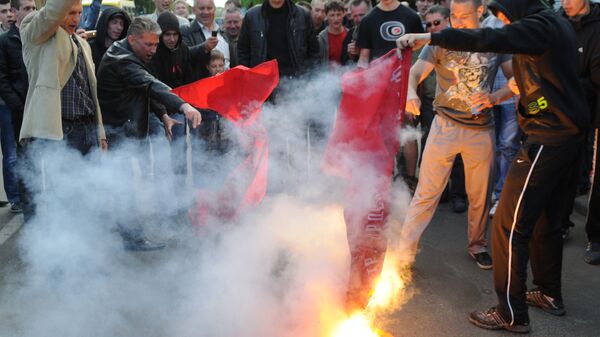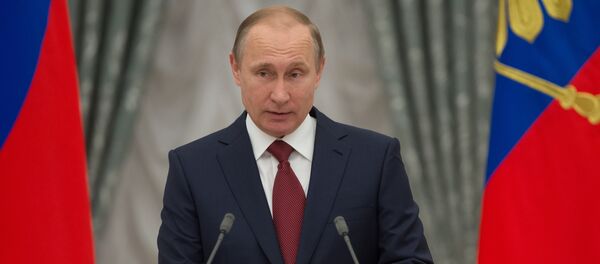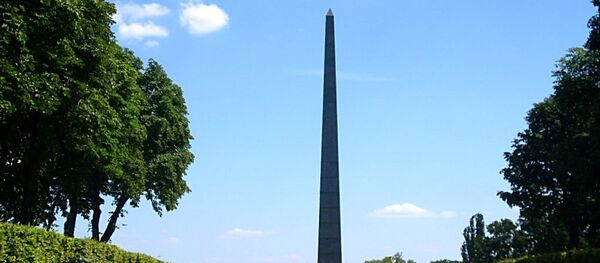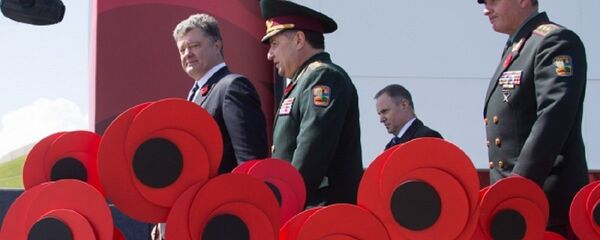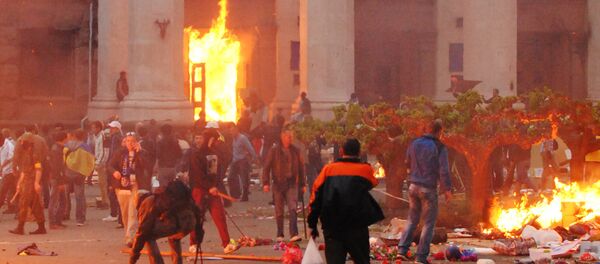Last week, Ukrainian Internal Affairs Minister Arsen Avakov warned of the possibility of 'provocations' in the country Monday during the commemoration of the 71st anniversary of victory in the Great Patriotic War, the name given to the Soviet Union's war against Nazi Germany between 1941 and 1945.
"We have a big country. In a big country there is a large population and a lot of fools; therefore all sorts of provocations are possible," Avakov said, according to Ukrainian media.
Commenting on Avakov's talk of 'provocations,' Lenta.ru columnist Nikolai Podgorny recalled that it is the Ukrainian government which is responsible for "for escalating the situation, and for aggravating all sorts of conflicts in society [over the holiday] in recent years."
Unfortunately, "if in quieter times Victory Day was accompanied by confrontations, this year the holiday may result in serious shocks," the journalist warned.
It was following Ukraine's first color revolution, in 2004, that Ukrainian authorities began to play down the significance of Victory Day, Podgorny recalls.
"Under President Viktor Yushchenko, Victory Day was still celebrated at the official level, but even then Kiev began charting a course toward reducing the holiday's significance and filling it with new meaning. For example, Yushchenko moved the traditional military parade [from May 9] to August 24, Ukraine's Independence Day, and attempted to make the soldiers of the Ukrainian Insurgent Army (UPA) out to be the main defenders of Ukraine from the Nazis."
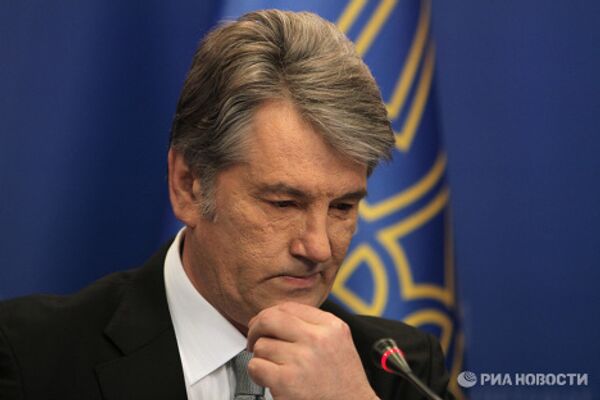
During Yushchenko's presidency, Ukraine filed an official request to the German government for information from the Wehrmacht's wartime archives about the UPA's fight against the Nazis. Apart from a few skirmishes and supply raids, nothing was found. In fact, throughout eastern Ukraine and in Russia, the UPA is viewed instead primarily as Nazi collaborators.
In his time, Yushchenko's efforts to glorify the UPA were met with strong criticism from Red Army veterans and their families.
"At the same time," Podgorny recalls, despite being "an explicit nationalist, Yushchenko [nevertheless] tried to keep up appearances, and was present at the May 9, 2005 parade in Moscow, and attended the Museum of the Great Patriotic War and the Tomb of the Unknown Soldier in Kiev."
"Viktor Yanukovych, in contrast to Yushchenko, began his presidency with a large-scale and spectacular celebration of Victory Day. On May 9, 2010, parades were held in major cities across the country, and Kiev saw a parade comparable in scale with Moscow's. In the Ukrainian capital, thousands of people wore the ribbon of St. George, and on Kreshchatyk, Kiev's main street, veterans and ordinary people carried a 142-meter Ribbon of St. George made in Odessa." At that time, the journalist noted, the crowd in Kiev applauded as Russian and Belarusian troops marched alongside the Ukrainian army in the parade.
Unfortunately, Podgorny added, "already then a 'center of resistance' had appeared – in Lviv. It's possible that this occurred with the tacit approval of the Yanukovych administration, which attempted to cultivate 'pocket' nationalists for its own purposes. In 2010, the local court banned any celebrations, and activists from the [neo-fascist] Svoboda Party threatened veterans, trampled and burned the Soviet flag," and the Banner of Victory (the military flag raised over the Reichstag on May 1, 1945).
"A year later, in 2011, May 9 saw real street fighting in Lviv, with Ukrainian radicals opposed by veterans and the pro-Russian Rodina Party, which, after a series of fights using weapons, rocks and smoke bombs, was able to raise the red Banner of Victory over Glory Hill, Lviv."
From the video report on the violence presented to Ukraine's parliament.
"On that day, local police did not allow veterans to lay flowers at the local war memorial, and the Russian Consul General had his wreath taken away and trampled on; Svoboda activists attacked people wearing ribbons of St. George and forced them to take them off, eventually resulting in street battles between nationalists and Berkut riot police."
Unfortunately, Podgorny notes, "Kiev at the time preferred to hush up the situation and not to draw any conclusions, and today we can only guess to what effect this decision had in untying the hands of the ultranationalists in their frenzied activity, which ended in the coup d'état of the winter of 2014."
"In April 2015, it was decided to abandon the terms 'Great Patriotic War' and 'Victory Day', and now the holiday is called the 'Victory Day over Nazism in World War II'…According to President Poroshenko, Kiev is now celebrating the holiday 'under a new Ukrainian system of coordinates'."
"For example, the main activities take place on May 8, the 'Day of Remembrance and Reconciliation', 'as in the civilized world', even though authorities have promised, for now, to leave May 9 as a holiday."
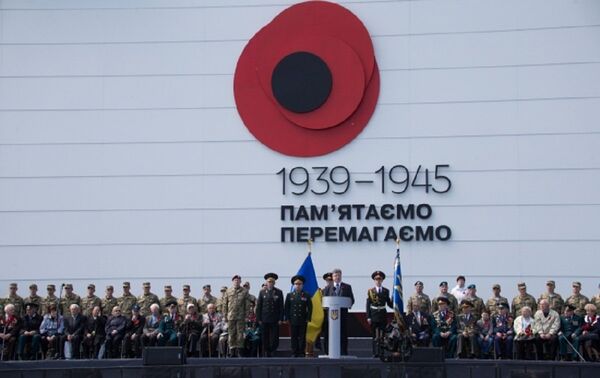
The 'new system of coordinates' also includes a new symbol for the holiday: the European red poppy, as well as a new military medal, with red and black stripes (red and black are the traditional colors of the UPA).
"Last year," Podgorny recalls, "thanks to the corresponding propaganda and thousands of security officers on the streets of Kiev, the city managed to avoid any confrontations. In the regions things did not go as smoothly. In Dnipropetrovsk, there were reports of terrorist attacks being prevented; Kharkov and Mariupol saw clashes, and Melitopol saw locals booing a Ukrainian military officer who was making a speech about 'invaders' by drowning him out by singing 'The Sacred War'."
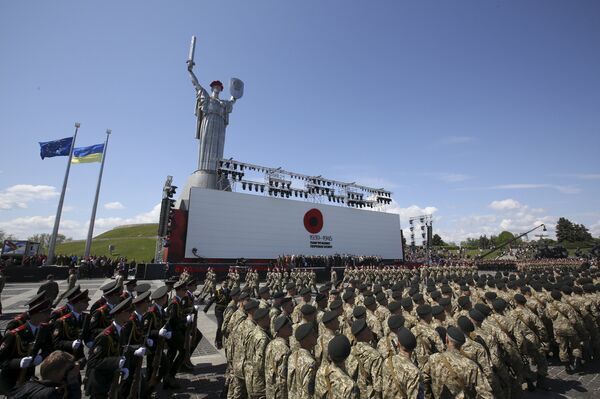
This year, the journalist noted, "authorities have decided to try a new method: to ignore the holiday as much as possible. A minimum of official events, no guests from overseas, the main emphasis on the Day of Remembrance and Reconciliation and the red and black symbols introduced last year, and the banning of the Victory Banner in accordance with the so-called 'law on decommunization'."
Furthermore "financial assistance to veterans and their families looks more like a mere handout: the Ministry of Social Policy was instructed to provide 'timely and full payment of one-time assistance' on May 5, and it's clear the payment will not be made in time for the holiday. War veterans and former prisoners of concentration camps, ghettos and other places of detention will be paid 'as much as' 400 hryvnia – about $15 US."
Other regions have been advised to tone down celebrations, with Kharkiv Mayor Hennadiy Kernes urging residents of Ukraine's second-largest city "to congratulate veterans, to give them your full attention, and to spend these days with family and friends, but not to gather at mass events."
Ultimately, Podgorny notes, "despite all these measures and statements, May 9, in the minds of Ukrainians, has remained a radiant holiday with all its traditional symbols. Ukrainians will undoubtedly express their attitudes toward it; the only question that remains is what price they will pay for clashing with the newly created reality."

